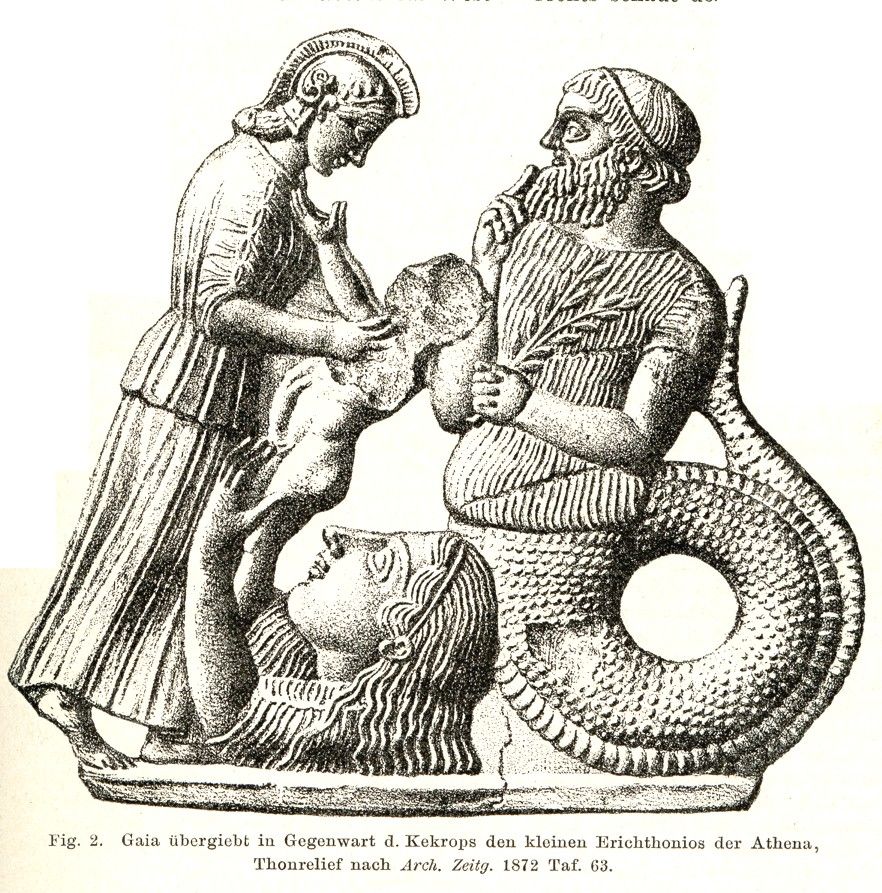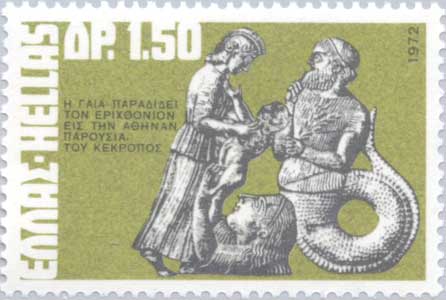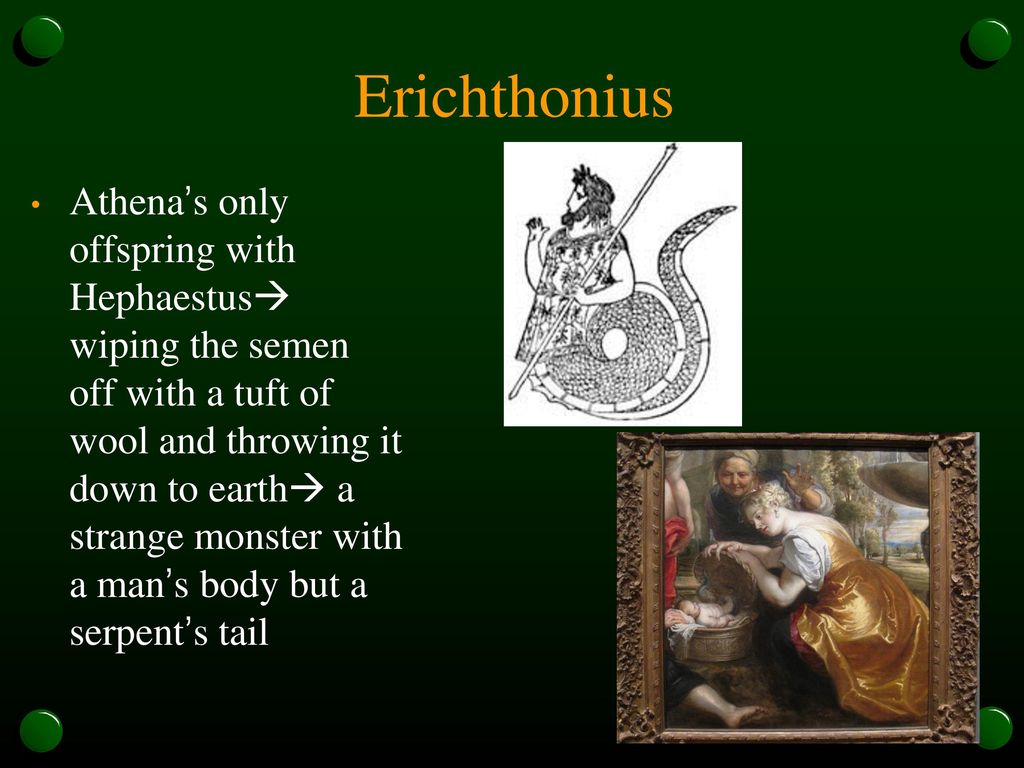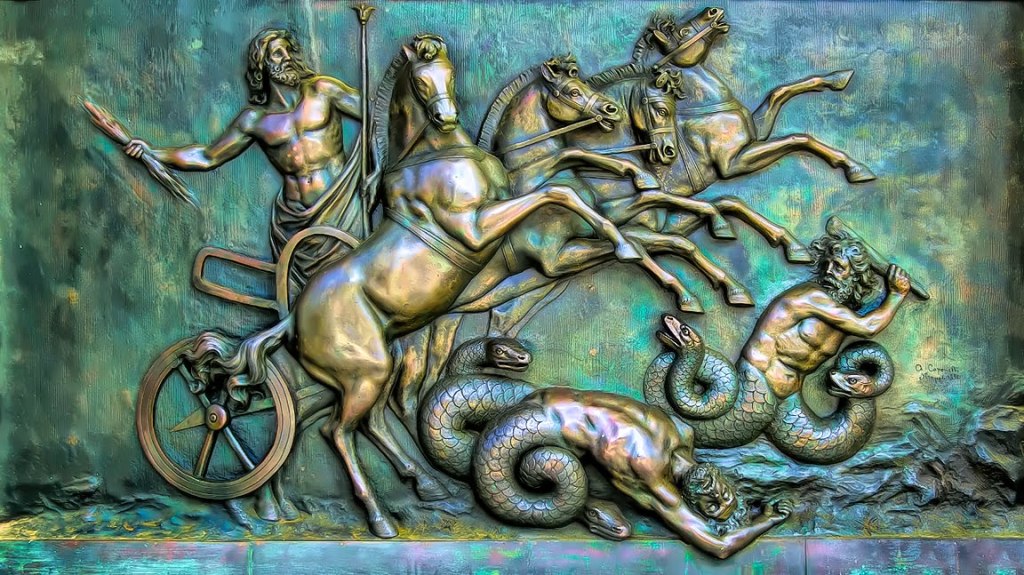
HomeGreek MythologyCecrops & Erichthonius
Cecrops & Erichthonius
Cecrops was the first king to rule from Athens (his father-in-law, Actaeus, had his capital elsewhere in Attica). His torso, arms and head were human, but being earth-born his lower body was a serpent’s. Wise and virtuous, Cecrops taught his people the art of literature as well as the rites of burial and marriage, and piously worshipped Zeus. But he refused to make blood offerings, preferring to burn cakes on the altar, a tradition which Athenians preserved in one of their rituals.
Cecrops’ successor was Erichthonius. He, too, was a hybrid man and snake, and his conception was unusual. Seeing Athene walking modestly on the Acropolis, Hephaestus tried to rape her. The virgin goddess rebuffed him, but he ejaculated uncontrollably over her thigh. Athene wiped off the semen with a handful of wool, which she flung to the ground and soon forgot. But the semen soaked into the soil, where it impregnated Gaia. The resultant child was Erichthonius (‘Wool-Earth’).

Horrified at his appearance, Athene locked Erichthonius into a box, which she gave to Cecrops’ three daughters with instructions never to open it, but, tantalized, two could not resist. They prised off the lid and looked inside. Screaming in terror at the snaky child, they dropped the box, ran to the Acropolis’ edge and threw themselves to their death. Only Pandrosus (‘All-Dewy’), the third of Cecrops’ daughters, survived. In historical times she was honoured with a garden near Athene’s olive tree and Poseidon’s well on the Acropolis.
Outraged at the girls’ disobedience, Athene dropped the rock she was carrying to augment the Acropolis. It remained jutting up abruptly from the soil: Mount Lycabettus. Erichthonius grew up to rule Athens. Sloughing off his human element, he was worshipped as a sacred serpent well into the Classical age and fed with honey cakes.

Tros “Trois” King of Troy
The son of Erichthonius and Astyoche. He was the king of Phrygia, and the country and people of Troy derived their name from him.1 His wife was Callirrhoe, daughter of the river god Scamander, by whom he had three sons, Assaracus, Ilus, and Ganymede, and a daughter, Cleopatra.2 His son Ganymede, a youth of exceptional beauty, was abducted by Zeus to be his cup-bearer. Zeus repaid Tros for his loss with the finest of all horses beneath the sun, those that carry the immortals.3
In Greek mythology, King Tros of Dardania (1375 BC – 1328 BC), son of Erichthonius from whom he inherited the throne and the father of three named sons: Ilus, Assaracus, and Ganymede. He is the eponym of Troy, also named Ilion for his son Ilus.
When Zeus abducted Ganymede, Tros grieved for his son. Sympathetic, Zeus sent Hermes with two horses so swift they could run over water. Hermes also assured Tros that Ganymede was immortal and would be the cupbearer for the gods, a position of much distinction.
In variant versions Ganymede is son of Laomedon son of Ilus son of Tros.
It was from Tros that the Dardanians were called Trojans and the land named the Troad.
Troas (Tros) died in 1314 BC. He held the royal title of King of Troy. Parents: Erichthonius.
Children were: Ilus, Assaracus.

In Greek mythology, King Tros of Dardania, son of Erichthonius from whom he inherited the throne and the father of three named sons: Ilus, Assaracus, and Ganymedes. He is the eponym of Troy, also named Ilion for his son Ilus. Tros’s wife was said to be Callirrhoe, daughter of the River God Simois, or Acallaris, daughter of Eumedes.
When Zeus abducted Ganymedes, Tros grieved for his son. Sympathetic, Zeus sent Hermes with two horses so swift they could run over water. Hermes also assured Tros that Ganymede was immortal and would be the cupbearer for the gods, a position of much distinction.
!Chart condensed by W.H.Probus-Pleming from charts by M.H.Gayer & Rev W.M.H.Milner. Queen Elizabeth Descendant of King David.
!Scritures; Royal Line Chart Compiled by Albert F. Schmuhl !Kinship of Families by A.F. Bennett:
The city of Troy was name for him and his people were known as Trojans in his honor.
FILE: The Royal Line (Adamic Genealogy) March 1980, Albert F. Schmuhl; Peter Grard Gentala
REIGNED: King of Troy
The genealogy of the Trojan family as stated in tradition; this includes genealogies as pure myth, but more than likely, when a legendary charater is said to be the child of a god or goddess, one may glean from this that they are the child of the high priest or priestess of that particular deity.
OCCUPATION: Roman Consul A.U.C. 487 (267 B.C.)
!FIRST OF THE CAESERS
OCCUPATION: Military Tribune, Proconsul in Liguria A.U.C. 573 (181 B.C.)
MILITARY: Military Tribune in A.U.C. 351. (403 B.C.)
OCCUPATION: Roman Consul (482 B.C.), Decemvir (451 B.C.)
FILE: Peter Grard Gentala
REIGNED: king of Latium
Father of the Roman Nation (after the destruction of the city of Troy by the Greeks in 1185, AEneas came to Italy)
When a mythological figure is given in the parentage of a legendary character, it should be noted that the genealogy is either totally bogus or that the parentage is really the high priest of priestess of the mythological figure. Aeneas’s mother was most likely the high priestess of the Goddess Aphrodite.
Father of the Roman Nation (after the destruction of the city of Troy by the Greeks in 1185, AEneas came to Italy)
NAME: Capys of the Royal House of Troy
OCCUPATION: Prince of Troy
ADAM AND EVE GENEALOGY:
Notes for KING OF DARDANIA TROS:
Two Ruling Houses
Tros succeeded his father Erichthonius to the throne. He gave his name to the land (Troad) and to the people living in the Troad (Trojans). His son, Ganymede was so beautiful, that Zeus in the form of an eagle, abducted the youth. Ganymede became the cupbearer in Olympus. Zeus gave Tros a couple of immortal horses and vine made of gold, to compensate for abducting the king’s son.
The Dardanians people, was then divided into two separate groups, between his two other sons by Callirrhoë (Callirrhoe): Ilus and Assaracus. Assaracus succeeded his father and continued to rule at Dardania, while Ilus chose to move closer to the sea. Ilus founded the city that he named Ilium, after himself. Ilium was, however, often called Troy, after his father. The two brothers began to rule two separate houses.
On the Dardanian line, Assaracus’ son, Capys, married Themiste, daughter of Ilus and Eurydice. Capys became the father of Anchises. Anchises was a lover of Aphrodite, who bore him a son and hero, Aeneas. Zeus struck Anchises with a thunderbolt, when he boasted of having slept with the love-goddess. He became a cripple, unable to walk. His son ruled Dardania in his place. Aeneas was the only leader, who fought on the Trojan side, to survive the Trojan War.
More About KING OF DARDANIA TROS:
Individual Note: He gave his name to the land (Troad) and to the people living in the Troad (Trojans).
Title-: King of Dardania
More About QUEEN OF TROY CALLIRRHOE:
Title-: Queen of Troy
Child of TROS and CALLIRRHOE is:
4. i. KING OF TROY ILUS29, b. 1315 BC – Dardania, Troad, Phrygia, Asia Minor; d. 1279 BC – Ilium/Troy, Troad, Phrygia, Asia Minor.
{geni:occupation} Tros King of Troy (Ilium), Kung av Troja, the Dardanian, King, Kung, d.ca1328bc, Died 1281 BC, Koning, King of Troy

House of Troy and Dardania Explained
The first ruler of the region around Troad was Teucer, the son of the river god Scamander. It was Dardanus, son of Zeus and the Pleiad Electra, who had founded the kingdom, and the dynasty of Dardania and Troy (or Ilium). Often the names of the Dardanians and the Trojans are used interchangeably. However, they are two different cities.
The line of Dardania is longer than that of Troy, but it is Troy that became the more powerful kingdom of the two. Troy had only three kings: Ilus, Laomedon and Priam. Laomedon became involved in the earlier war against the Greeks, led by the hero Heracles. During the reign of Priam, Troy fell after a ten-year long war was fought between the Greeks and the Trojans, known as the Trojan War.
Priam had many children that are listed here, from his two wives, Arisbe and Hecuba, and from his concubines. I have only listed those children that play more or less important roles in classical mythology.
See the House of Troy for the description of Troy and their rulers.
Another family tree on Aeneas can be found in the Houses of Rome, because Aeneas with other Trojan survivors had migrated to Latinum, after the fall of Troy. Aeneas had founded a city, which he called Lavinium, which was named after his second wife Lavinia. His son, Acanius was the founder of the kingdom, Alba Longa. One of his descendants (Romulus) became the founder of Rome, and became its first king.
Note that after the capture of Troy, Andromache, wife of the hero Hector, became the concubine of Neoptolemus, son of Achilles. She had bore him three sons, Molossus, Piela and Pergamus. When Neoptolemus released Helenus and Andromache, Andromache married her husband’s brother (Helenus). According to another version, Apollodorus says that Helenus married Neoptolemus’ mother, Deidameia, not to Andromache.